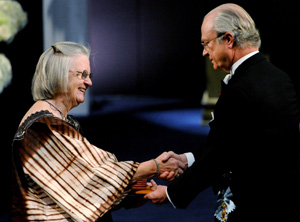The first woman to win the Nobel Prize in Economic Sciences, she will discuss issues related to the governance of water resources
 Elinor Ostrom, the first woman to win the Nobel Prize in Economic Sciences, will be on campus March 4 to interact with students and discuss her research focusing on the governance of water and other common resources.
Elinor Ostrom, the first woman to win the Nobel Prize in Economic Sciences, will be on campus March 4 to interact with students and discuss her research focusing on the governance of water and other common resources.
Sponsored by the Robert B. and Helen S. Meyner Center for the Study of State and Local Government, the policy studies program, and the environmental studies initiative, Ostrom’s lecture will be at 7:30 p.m. in Colton Chapel. The event is free and open to the public. She will also be meeting with select students and faculty from various majors throughout the day during an informal lunch and dinner and a discussion forum.
“Professor Ostrom is a giant in both the fields of political science and economics,” says Mark Crain, Simon Professor of Political Economy and chair of policy studies.“What’s unusual is she received the Noble Prize in Economics, yet her degrees and academic positions are in political science. She transcended these disciplines with great success. This speaks to the power of interdisciplinary thinking and meshes wonderfully with interdisciplinary approaches we are pursuing here at Lafayette.”
Ostrom, the Arthur F. Bentley Professor of Political Science, and co-director of the Workshop in Political Theory and Policy Analysis at Indiana University, received the Nobel Prize for her work on economic governance. Prior to her receiving it in Dec. 2009, 62 men were awarded the honor since its launch in 1969.
Her research focuses on common pool resources, such as forests, fisheries, oil fields, grazing lands, and irrigation systems. Her work emphasizes how humans and ecosystems interact to provide for long run sustainable resource yields and highlights how humans have created diverse institutional arrangements over natural resources for thousands of years that have prevented ecosystem collapse.
Ostrom is the author of hundreds of articles in scholarly journals and more than two dozen books, including Governing the Commons (1990); Understanding Institutional Diversity (2005) and Working Together: Collective Action, the Commons, and Multiple Methods in Practice (forthcoming 2010, with Amy Poteete and Marco Janssen). She has received research grants and awards from the Andrew W. Mellon Foundation, National Institute of Mental Health, National Science Foundation, United Nations Development Program, U.S. Department of Justice, U.S. Geological Survey, and many others.
